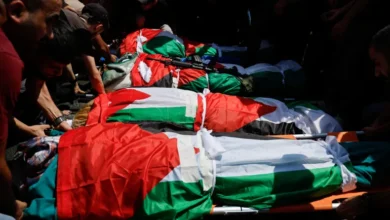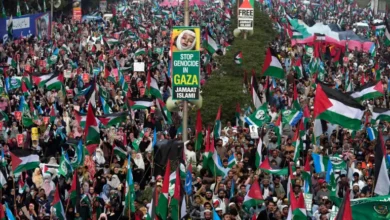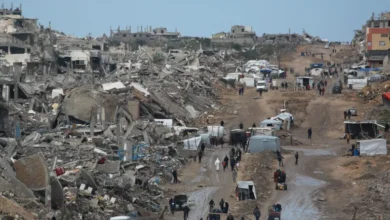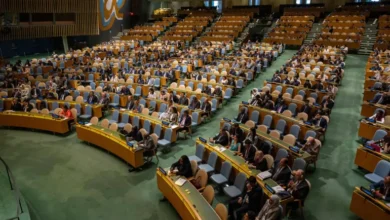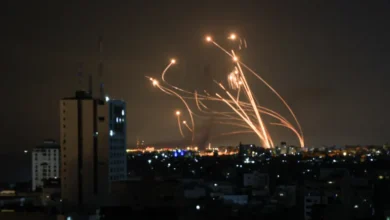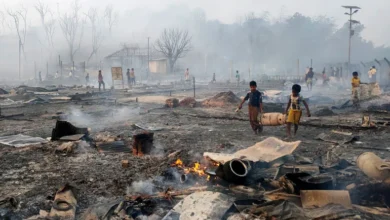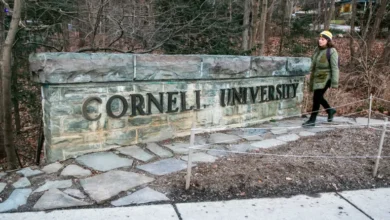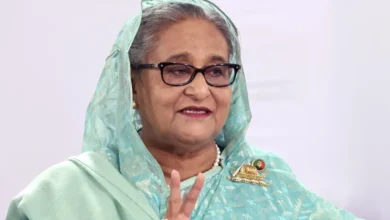Watching the watchdogs: Media, law and Gaza genocide
Rami G Khouri
The United States media, bar just a few exceptions, are refusing to engage seriously with one of the most important questions about Israel’s ongoing war on Gaza: Is Israel committing genocide against the Palestinians in the besieged enclave, and is the US complicit in this worst of all human crimes?
The American media’s avoidance of the growing allegations of genocide directed at Israel is not surprising. After all, since the beginning of this latest war, mainstream US media have eagerly justified and excused Israel’s atrocities against Palestinians. For example, they usually refer to blatant acts of ethnic cleansing and forced displacement in Gaza as “evacuations”, and claim Israel is “defending itself” against “terror” even as it continues to terrorise millions of civilians living under its occupation with bombs and bullets along with apartheid laws and settler-colonial policies of oppression.
Like its refusal to acknowledge Israel’s other atrocities against Palestinians and violations of international law, the US media’s reluctance to report on and discuss the accusations of genocide has real consequences.
As Prism, a progressive news outlet based in the US, recently noted, “through journalistic sleight of hand – including the use of passive language, ever-shifting headlines, bothsidesism, and the myth of objectivity – reporters across the US are fuelling the genocide their newsrooms are refusing to acknowledge is taking place”.
Indeed, what constitutes genocide is clearly defined in the 1948 Genocide Convention, and this is exactly what we witness in Palestine today. As leading genocide scholar Raz Segal recently stated, it is clear Israel is carrying out in Gaza “a textbook case of genocide”.
The American media’s hesitance to utter the word genocide in relation to Israel’s assault in Gaza, coupled with their tendency to downplay or outright deny Israeli crimes against Palestinians, signals to Israel that it can continue its killing spree with impunity, and reassures the US administration that it won’t be held to account for its complicity.
Thankfully, mainstream print and audio-visual media are not the only venues for concerned parties to draw attention to the ongoing genocide in Gaza, hold accountable and pressure its perpetrators to stop, and encourage political negotiations. Activists are turning to courts and peaceful public protests to try and hold accountable Israel and complicit foreign governments.
While the top international courts tasked with considering such issues – the International Criminal Court and the International Court of Justice – move at a snail’s pace, human and constitutional rights organisations have taken their case on the Gaza genocide to courts in the US.
This battle to recognise Israel’s genocidal assault on Gaza started in mid-October, when the Center for Constitutional Rights (CCR), a progressive non-profit legal advocacy organisation, published its legal analysis of US complicity in “Israel’s unfolding genocide” against Palestinians in Gaza. Then on November 3, alongside fellow legal non-profits, Palestine Legal and the National Lawyers Guild, the CCR took its case directly to Congress; it notified representatives that if they vote for an aid package to Israel they “could face criminal and civil liability for aiding and abetting genocide, war crimes, and crimes against humanity”.
The organisation then followed up on November 13 with a lawsuit involving half a dozen American and Palestinian plaintiffs, accusing President Joe Biden and his secretaries of state and defence of enabling Israel’s genocide. In the brief it submitted to the US District Court for the Northern District of California, the organisation argued that the Biden administration’s unconditional support for Israel constitutes “a breach of US responsibilities under customary international law, as codified in the Convention on the Prevention and Punishment of the Crime of Genocide”.
The organisations using US courts to charge Israel with genocide in US courts are not struggling to find evidence to support their claim. Many scholars of genocide and war crimes studies, like Raz Segal, are on their side.
The Genocide Convention defines the crime of genocide as any of five “acts committed with intent to destroy, in whole or in part, a national, ethnical, racial or religious group”. These five acts are: killing members of the group, causing them serious bodily or mental harm, imposing living conditions intended to destroy the group, preventing births, and forcibly transferring children out of the group. Many genocide and international law experts across the world agree that Israel has committed in Gaza at least the first three acts in this list with undeniable intent, and is thus guilty of genocide.
Just a week ago, on December 9, 55 scholars in Holocaust and genocide studies published an open letter condemning Hamas’s October 7 attack on Israel, but also stating that “the starvation, mass killing, and forced displacement of Palestinian civilians in Gaza is ongoing, raising the question of genocide, especially in view of the intentions expressed by Israeli leaders”.
The legal case for the US’s complicity in this genocide is equally strong.
Katherine Gallagher, the lead lawyer for CCR’s lawsuit against Biden and his colleagues, explained at a presentation in New York City that the US’s actions in support of Israel – including sending expedited military and economic aid to the country, blocking United Nations Security Council resolutions to implement a ceasefire, and giving Israel advanced weapons that few other states get, among others – clearly “cross the lines of complicity in genocide”.
“The US was put on notice of the likelihood of genocidal actions, and it should have taken action to prevent it,” she added, explaining that Israel could not pursue its present level of attacks without US aid and diplomatic protection at the UN.
On December 8, the US government asked the North California District Court to throw out the lawsuit, arguing on jurisdictional grounds that the judiciary cannot intervene in the executive branch’s foreign policymaking. The plaintiffs say the US is bound by the Genocide Convention it ratified and as such, must respect the requirement that all those who have the capacity to stop a genocide are obligated to do so.
The government’s demand that the CCR case is dismissed coincided with another US veto of a UNSC resolution for a ceasefire in Gaza, and a move by the administration to circumvent necessary congressional approval to immediately send Israel more artillery ammunition, which only reiterated Washington’s unconditional support for Israel’s war on Gaza.
A few days later, the World Health Organization said the healthcare situation in Gaza was “catastrophic” and warned that disease was spreading among the 1.9 million Palestinians in Gaza forced from their homes by Israel’s strikes and would probably worsen because of overcrowding in areas where civilians are seeking shelter. UN Secretary-General António Guterres, meanwhile, warned that there was “no effective protection of civilians in Gaza” and that there is increasing “pressure for mass displacement into Egypt”, signalling another war crime, known as forcible transfer, may be in the making. Around the same time, Save the Children said it had documented in Gaza the cases of more than 7,000 children under the age of five who were so malnourished that they required “urgent medical treatment to avoid death”.
As evidence for Israel’s genocide mounts and the US media avoids acknowledging what is happening before our eyes, discussions on the nature and extent of Israel’s crimes are throttled on US college campuses and in other public spaces; those daring to speak up are branded as anti-Semites and terror supporters, or even as advocates of genocide against Jews, which makes it critical that court cases like the CCR’s try and hold those responsible to account.
Over the past week, the round-the-clock media coverage of accusations of anti-Semitism at elite American universities such as Harvard, MIT and the University of Pennsylvania repeated the charge that allowing pro-Palestine protests and statements on campuses promoted anti-Semitism and threatened Jewish students, faculty and staff. Some particularly ignorant and extremist members of Congress, the academy, and the media even suggested that the accelerating ceasefire and pro-Palestine protests could be seen as part of an attempted genocide against American Jews.
Such an inversion of reality is not so unusual, when extremist pro-Israel fanaticism combines with equally hysterical desperation among American politicians. New benchmarks in political fantasy and dishonesty are now being set in the United States, when some extremists suggest that nonviolent activism for a Gaza ceasefire and equal rights among Palestinians and Israelis is genocidal, while the Israeli state, which claims to represent all the world’s Jews, is committing a verified genocide in Gaza.
History will not judge kindly the American media’s failure to recognise and accurately report on this moment. However, in the absence of adequate media and political scrutiny, it is encouraging that scores of scholars bravely provide evidence and speak up on the issue, and that American courts offer a venue to assess and hold accountable perpetrators and complicit state enablers of this generation’s iteration of humanity’s worst crime – genocide.
